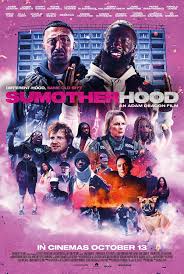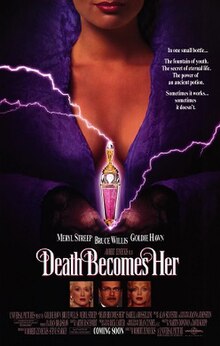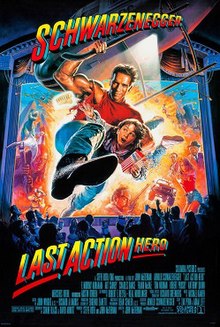
You didn’t see the man come flying out of the clouds? It was him! Metropolis. The Webscoe conglomerate hires bumbling computer programmer Gus Gorman (Richard Pryor) who embezzles through salami slicing. This brings him to the attention of CEO Ross ‘Bubba’ Webster (Robert Vaughn). Megalomaniacal Webster, his sister Vera (Annie Ross) and his assistant and girlfriend Lorelei Ambrosia (Pamela Stephenson) blackmail Gus into helping him. At the Daily Planet newspaper, reporter Clark Kent (Christopher Reeve) convinces editor Perry White (Jackie Cooper) to let him and photographer Jimmy Olsen (Marc McClure) visit Smallville for Clark’s high school reunion. Fellow reporter, Clark’s unrequited romantic interest Lois Lane (Margot Kidder) goes to Bermuda on holiday. En route, to Smallville, in his Superman guise, Clark extinguishes a fire in a chemical factory containing unstable beltric acid, which produces a corrosive vapour when it overheats. At the reunion, Clark reunites with childhood friend Lana Lang (Annette O’Toole) a divorcée with a young son named Ricky (Paul Kaethler). Clark is harassed by Lana’s ex, alcoholic security guard Brad Wilson (Gavan O’Herlihy) who was his former school rival and bully. While having a picnic with Lana, Superman saves an unconscious Ricky from being killed by a combine harvester. Angered by Colombia’s refusal to do business Webster orders Gus to command Vulcan, an American weather satellite, to create a tornado to destroy Colombia’s coffee crop, allowing Webster to corner the market. Gus travels to Smallville to use a Webscoe subsidiary to reprogramme the satellite. Although Vulcan creates a storm, Superman neutralizes it. Seeing Superman as a threat to his plans, Webster orders Gus to fabricate Kryptonite. Gus uses Vulcan to analyse Krypton’s debris. As one of the elements of Kryptonite is unknown, he substitutes tar. Lana convinces Superman to appear at Ricky’s birthday party but Smallville turns it into a town celebration. Gus and Vera, disguised as Army officers, give Superman the flawed Kryptonite as an award. Instead of weakening him, he becomes selfish and commits petty acts of vandalism such as straightening the Leaning Tower of Pisa and blowing out the Olympic flame. Gus asks Webster to build the world’s most sophisticated supercomputer and he does so in exchange for Gus creating an energy crisis by directing all oil tankers to the middle of the Atlantic. Lorelei seduces Superman, persuading him to waylay one of the tankers and cause an oil spill. Superman suffers a nervous breakdown and splits into two – the immoral, corrupted dark Superman and the moral, mild-mannered Clark Kent. The two fight, with Clark defeating his evil self. Finally regaining his sanity, Superman repairs the damage of the oil spill … Today – coffee. Tomorrow – the oil! The perception that this series was paying decreasing returns arose when Richard Donner was replaced by Richard Lester for the second iteration. Lester is back in the director’s chair for the third which commences with a breezy Tati-esque slapstick ballet and proceeds towards a sequence of action setpieces both visually and comically pleasing. Gene Hackman’s charismatic Lex Luthor is replaced by a less colourful Robert Vaughn while Kidder’s Lois Lane is sidelined for childhood sweetheart Lana Lang, the latter for story reasons (and allegedly a punishment), the former presumably because along with Kidder, Hackman was reportedly angered over the Salkinds’ treatment of Donner and washed his hands of the whole enterprise. Superman you’re just in a slump – you’ll be great again. Husband and wife screenwriting team David & Leslie Newman are back writing the screenplay (along with uncredited contributions by Mario Puzo) adapting the characters created by Jerry Siegel & Joe Shuster, which takes the trope of dual identity a step further and this could easily have been subtitled Man/Superman, Shavian style. You’re a genius – you’ve invented a machine that can find anybody’s weak spots. Pryor is both a problem and a draw – his shtick is artfully applied to his essentially comical anti-hero role but the risk to the narrative is making him a character as significant as our ostensible protagonist. The film itself struggles to maintain its narrative balance while it performs this tripwire act. Meanwhile, Superman himself not only has to deal with a bifurcate identity as Clark Kent, he has to handle being Bad Superman too. You’re going to go down in history as the man who killed Superman! Effectively operating as a genre satire as much as being a sequel, this doesn’t have the magical resonance of the first film or even the pizzazz of the second but it’s never boring. There’s some splendid costume design from Evangeline Harrison (she did TV’s Love for Lydia: respect) other than the obvious, there’s a wonderfully expressive wardrobe for ditzy peroxide galpal Stephenson who spends her time reading Kant when she thinks no one’s looking. Nowadays the effects look fairly shonky but there’s a lot to love here, from the gorgeously shot wheat fields to the relationship between Clark and Lana and the running jokes including one concerning that tower in Pisa. And of course the John Williams theme over the credits is for the ages. Thank the Lord for Superman



